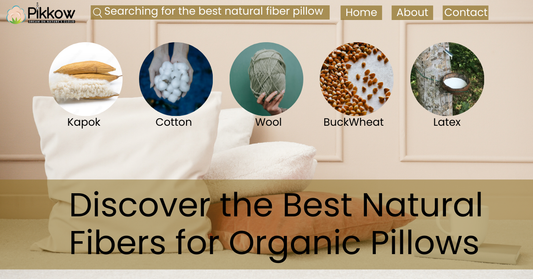A good night’s sleep is essential for overall health and well-being, but did you know that your pillow could be affecting your sleep quality? Many conventional pillows are filled with synthetic materials and harmful chemicals that can disrupt your sleep and harm your health. That’s why choosing organic non-toxic pillows is crucial for creating a healthier sleep environment.
In this blog, we’ll explore the importance of non-toxic pillows for sleep, the role of organic bedding essentials for restful sleep, and how chemical-free pillows and sleep health go hand in hand.
Why Your Pillow Matters for a Good Night’s Sleep
The Hidden Dangers of Conventional Pillows
Most store-bought pillows are made from synthetic materials like memory foam, polyester, and polyurethane foam, which contain harmful chemicals such as:
- Volatile Organic Compounds (VOCs): Can cause headaches, dizziness, and allergic reactions.
- Flame Retardants: Linked to hormone disruption and respiratory issues.
- Pesticides & Formaldehyde: Often used in cotton production, contributing to skin irritation and poor air quality.
How Non-Toxic Pillows Improve Sleep Quality
Switching to organic and chemical-free pillows eliminates exposure to toxins, allowing for:
- Improved Air Quality: Reducing allergens and chemicals in your bedroom.
- Better Respiratory Health: Avoiding irritants that cause breathing problems.
- Enhanced Comfort: Natural materials provide better support and temperature regulation.
The Importance of Non-Toxic Pillows for Sleep
1. Free from Harmful Chemicals
Unlike conventional pillows, organic pillows are made using chemical-free and hypoallergenic materials such as:
- Organic Cotton: Breathable, pesticide-free, and soft on the skin.
- Kapok Fiber: Lightweight, airy, and completely natural.
- Organic Wool: Naturally resistant to dust mites and mold.
- Natural Latex: Provides excellent support without toxic additives.
2. Hypoallergenic and Ideal for Sensitive Sleepers
Many people suffer from allergies due to dust mites, mold, and synthetic fabrics. Organic pillows prevent:
- Skin Irritations – No harsh dyes or chemicals.
- Respiratory Issues – No VOCs or flame retardants.
- Allergic Reactions – Naturally resistant to dust mites and mold.
3. Sustainable and Eco-Friendly
Organic pillows aren’t just better for you—they’re better for the planet. Choosing organic bedding essentials for restful sleep reduces:
- Pesticide Use: Conventional cotton farming is responsible for 16 percent of global pesticide use.
- Water Waste: Organic farming methods save thousands of liters of water.
- Landfill Waste: Synthetic pillows take hundreds of years to decompose.
Comparing Organic vs. Synthetic Pillows
|
Feature |
Organic Non-Toxic Pillows |
Conventional Synthetic Pillows |
|
Materials |
Organic kapok, latex, wool, kapok |
Polyester, memory foam, polyurethane |
|
Chemical-Free |
Yes |
No |
|
Hypoallergenic |
Yes |
No |
|
Breathability |
High |
Low |
|
Durability |
Lasts 5-10 years |
Breaks down in 1-3 years |
|
Eco-Friendly |
Sustainable materials |
Non-biodegradable |
Best Organic Bedding Essentials for Restful Sleep
1. Organic Mattress
Your mattress is just as important as your pillow. A natural latex or organic cotton mattress helps maintain a chemical-free sleep environment.
2. Non-Toxic Pillows
Choose Organic kapok pillows to avoid exposure to synthetic chemicals and allergens.
3. Breathable Organic Sheets
Go for GOTS-certified organic cotton, bamboo, or linen sheets to improve air circulation and skin comfort.
4. Wool or Kapok Comforters
Ditch synthetic comforters and opt for organic wool or Kapok options, which regulate body temperature and wick away moisture.
5. Natural Pillowcases
Avoid synthetic, chemical-treated pillowcases. Organic kapok, silk, or bamboo are the best choices for healthy skin and hair.
How Chemical-Free Pillows Improve Sleep Health
1. Enhancing Sleep Posture and Support
A good pillow provides the right neck and spine alignment. Organic latex and wool pillows offer better support compared to flat, synthetic options.
2. Reducing Sleep Disturbances
Tossing and turning? Organic pillows:
- Reduce overheating – Natural fibers wick away moisture.
- Minimize allergies – No synthetic irritants.
- Improve breathability – Better airflow keeps you cool.
3. Long-Term Health Benefits
Switching to chemical-free pillows can reduce:
- Chronic headaches caused by VOC exposure.
- Skin breakouts due to chemical residue.
- Respiratory problems from synthetic fibers.
How to Choose the Right Organic Pillow for You
1. Consider Your Sleeping Position
- Side Sleepers: Medium to firm pillows (organic latex or kapok).
- Back Sleepers: Medium loft (organic wool or kapok).
- Stomach Sleepers: Soft, low-loft pillows (organic kapok).
2. Check Certifications
Look for:
- GOTS (Global Organic Textile Standard) – Ensures organic materials.
- OEKO-TEX Standard 100 – No harmful substances.
- GOLS (Global Organic Latex Standard) – Certifies natural latex.
3. Opt for Adjustable Loft and Firmness
Some organic pillows adjust filling to your preferred firmness—great for personalized comfort.
Conclusion
Switching to organic, non-toxic pillows is one of the best things you can do for better sleep, improved health, and a more sustainable planet. The importance of non-toxic pillows for sleep cannot be overstated—they eliminate harmful chemicals, support proper spinal alignment, and create a healthier sleep environment.
Investing in organic bedding essentials for restful sleep is a long-term investment in your health, comfort, and overall well-being. Make the switch today and experience deeper, more restful sleep without toxins.
Also Read :
Surprise Your Partner with the Softest Sleep Upgrade
Couples' Pillow Collection: Designed for Optimal Comfort and Support
Pillow Gift Ideas for Every Loved One: Thoughtful Comfort for Valentine’s Day
The Perfect Pillow Gift: Why a Kapok Pillow is the Ultimate Expression of Love
FAQs
1. What are the best materials for non-toxic pillows?
The best materials include organic cotton, wool, kapok, and natural latex, all free from harmful chemicals.
2. How often should I replace an organic pillow?
Organic pillows last between five to ten years, depending on the material and care.
3. Are organic pillows worth the price?
Yes. While they may cost more upfront, they offer better durability, health benefits, and sustainability than synthetic pillows.
4. Can organic pillows help with allergies?
Absolutely. Chemical-free pillows and sleep health go hand in hand since organic materials are hypoallergenic and resistant to dust mites.
5. Where can I buy high-quality organic pillows?
Look for GOTS-certified brands or eco-friendly bedding stores specializing in organic bedding essentials for restful sleep.











